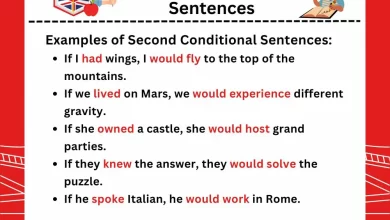20 Examples of First Conditional Sentences
Understanding conditional sentences is a crucial aspect of mastering the English language, especially for those looking to achieve fluency. Among the various types of conditionals, the first conditional is commonly used in everyday conversation. In this guide, we delve deep into the first conditional, offering 20 detailed examples and explanations to enhance your understanding and usage.
Understanding the First Conditional
The first conditional is used to express situations that are possible and likely to occur in the future if a certain condition is met. It is often structured with an “if” clause (present simple) and a main clause (will + base verb). This structure illustrates potential outcomes that depend on specific conditions.
Structure of the First Conditional
- If Clause: Present Simple
- Main Clause: Will + Base Verb
For example:
- If it rains tomorrow, we will cancel the picnic.
Why Use the First Conditional?
The first conditional is used to talk about real and possible situations. It is a practical tool for discussing plans, predictions, warnings, and offers. Mastering this form enables speakers to express themselves clearly regarding future events that are influenced by current conditions.
20 Examples of First Conditional Sentences
- If you study hard, you will pass the exam.
- This sentence suggests a likely outcome (passing the exam) based on a specific action (studying hard).
- If it rains today, we will stay indoors.
- Here, staying indoors is dependent on the condition of rain.
- If you call her now, she will answer.
- This implies that calling now increases the likelihood of getting a response.
- If they arrive early, we will have more time to prepare.
- More preparation time is conditional on their early arrival.
- If you finish your work, we will go out for dinner.
- Going out for dinner is contingent on completing the work.
- If the weather is nice, we will go for a walk.
- The walk is planned, provided the weather is nice.
- If you help me, I will appreciate it.
- Appreciation is guaranteed if help is offered.
- If she learns to drive, she will buy a car.
- Buying a car depends on her learning to drive.
- If the store has the book, I will buy it.
- The purchase of the book hinges on its availability.
- If you invite him, he will come to the party.
- His attendance is conditional upon receiving an invitation.
- If we leave now, we will catch the bus.
- Catching the bus depends on leaving immediately.
- If he doesn’t apologize, she will be upset.
- Her being upset is linked to his lack of an apology.
- If you practice regularly, you will improve your skills.
- Skill improvement is contingent on regular practice.
- If it gets cold, we will turn on the heater.
- Turning on the heater is dependent on a drop in temperature.
- If the traffic is light, we will reach on time.
- Timely arrival depends on the condition of traffic.
- If you join the club, you will make new friends.
- Making friends is associated with joining the club.
- If we save enough money, we will travel to Europe.
- Traveling to Europe is based on saving enough money.
- If you tell the truth, people will trust you.
- Gaining trust is conditional on being truthful.
- If they complete the project, they will receive a bonus.
- Receiving a bonus is dependent on project completion.
- If she attends the meeting, she will gain valuable insights.
- Gaining insights is linked to her attendance at the meeting.
How to Use the First Conditional Effectively
Understanding the first conditional is not just about forming sentences; it’s about knowing when and how to use them effectively. Here are some tips to maximize the use of first conditional sentences:
- Realistic Situations: Ensure that the condition and result are plausible and likely. Use this form to discuss real-life scenarios where the outcome depends on the condition.
- Expressing Plans and Predictions: Use first conditional sentences to outline plans or make predictions that have a real chance of happening.
- Warnings and Advice: Utilize this structure to give warnings or advice. For example, “If you don’t wear a coat, you will catch a cold.”
- Offers and Promises: You can also use it to make offers or promises. For instance, “If you need help, I will be there for you.”
Common Mistakes to Avoid
While using the first conditional, learners often make mistakes that can confuse the intended meaning. Here are a few common errors and how to avoid them:
- Using the Wrong Tense: Ensure that the “if” clause is in the present simple, not future. Incorrect: “If it will rain, we will stay indoors.” Correct: “If it rains, we will stay indoors.”
- Confusing with Other Conditionals: Differentiate between first conditional and other types like zero, second, and third conditionals, which serve different purposes and structures.
- Overuse of ‘Will’: Avoid using “will” in the “if” clause. The use of “will” should only be in the main clause.
Conclusion
Mastering the first conditional is essential for effective communication in English. It allows speakers to articulate potential future events based on current conditions clearly. By practicing these structures, you can enhance your conversational skills and express complex ideas with greater precision.
